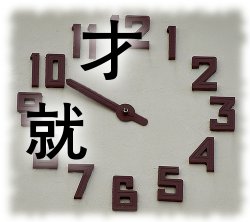就 and 才 in Mandarin: as early as, not until
 The characters 就 (jiù) and 才 (cái) have a lot of uses in Mandarin Chinese.
The characters 就 (jiù) and 才 (cái) have a lot of uses in Mandarin Chinese.
A common one is to express that events have occurred earlier or later than the speaker expected.
Like other Mandarin adverbs, 就 and 才 both appear in front of the verb.
就: as early as
By placing 就 in front of the verb, you can indicate that the event took place sooner than would be expected. This could be translated into ‘as early as’ or ‘as quickly as’, but in English it’s often not explicitly stated. When 就 is used in this way, the sentence will usually end with the particle 了 to mark the completed action.
Example sentences:
我们早上九点上课,可是他八点就来了。 Wǒmen zǎoshang jiǔ diǎn shàngkè, kěshì tā bā diǎn jiù lái le. We start class at 9am, but he came as early as 8 o’clock.
_(This one is a classic example for 就 grammar!)_她十八岁就大学毕业了。 Tā shíbā suì jiù dàxué bìyè le. She graduated from university at eighteen years old [that early!] . _Or, more idiomatically:_ She was only 18 when she graduated from university.
我们班的球员比赛开始五分钟后就得了一分。 Wǒmen bān de qiúyuán bǐsài kāishǐ wǔ fēnzhōng hòu jiù dé le yī fēn. One of our players scored a goal just five minutes after the match started.
才: not until, as late as
才 functions in much the same way as 就, but expresses the opposite meaning. It would usually be rendered as ‘not until’ or ‘as late as’ in English. Sentences using 才 in this way usually do not end with 了.
Example sentences:
我们九点上课,可是他九点一刻才来。 Wǒmen jiǔdiǎn shàngkè, kěshì tā jiǔ diǎn yīkè cái lái. We start class at nine o’clock, but he didn’t come until quarter past.
昨天晚上我的女儿一点半才回家。 Zuótiān wǎnshàng wǒ de nǚér yīdiǎn bàn cái huí jiā. Last night my daughter didn’t come home until half past one.
他二十八岁才拿到驾驶执照。 Tā èrshíbā suì cái ná dào jiàshǐ zhízhào. He didn’t get a driving licence until he was twenty-eight.
